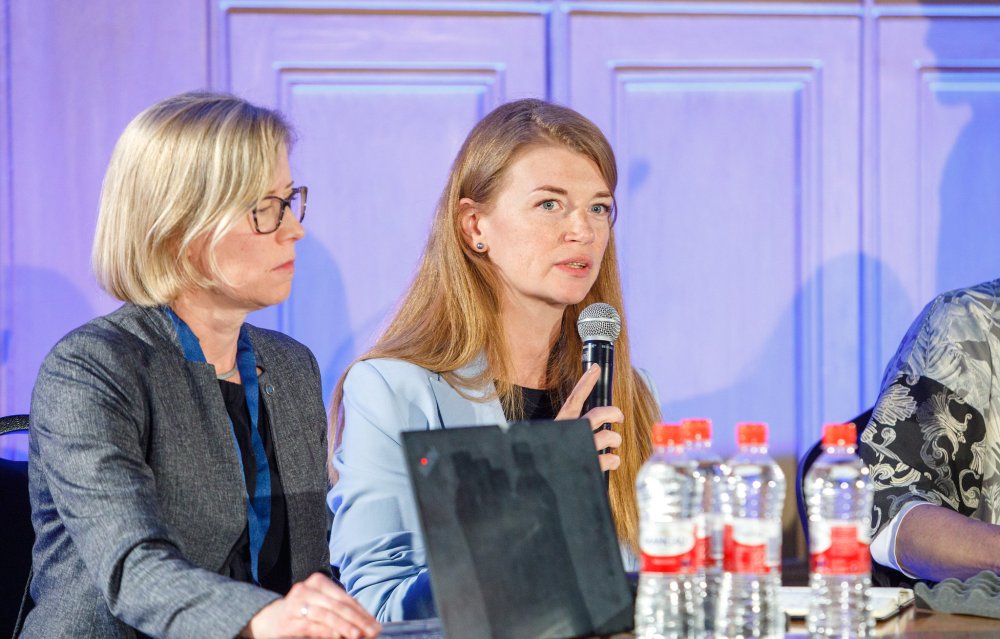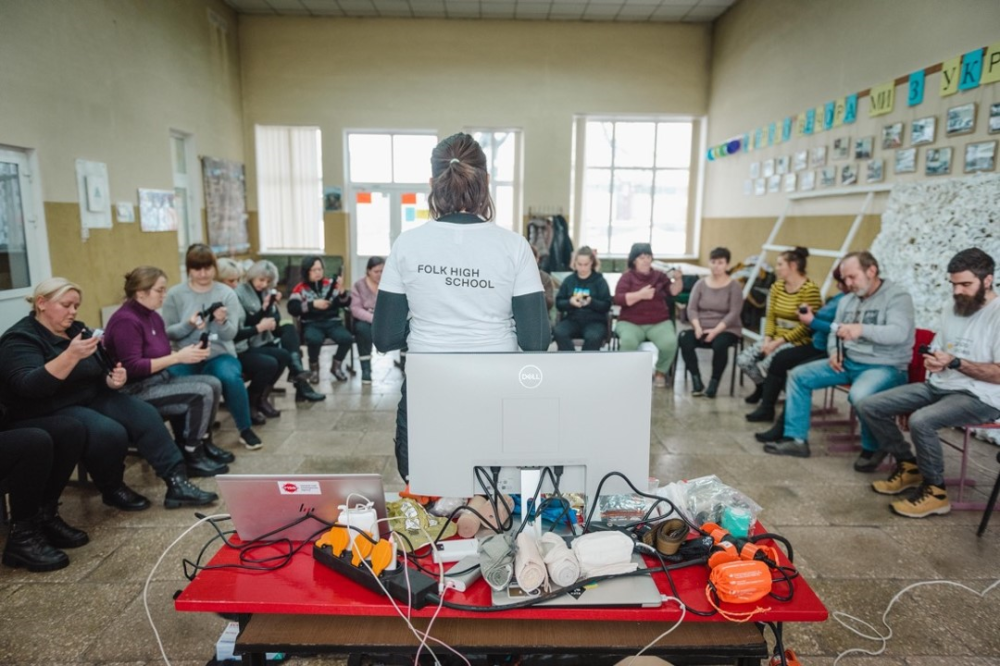News
- Details
- Published: 21 November 2023
Text: Anja Karppinen, Baltic Sea Strategy Point
Contributing to the recovery of Ukraine is one of the EUSBSR priorities guiding our work. In December 2022, the EUSBSR launched the first initiatives for cooperation between the Baltic Sea Region and Ukrainian stakeholders, with the follow-up steps taken over the year. Today, there are several initiatives in different Policy Areas, both regarding immediate support, sustainable rebuilding, and the road towards full EU membership.
Recovery with EU membership in mind
The EU membership comes with several requirements related to environmental standards and practices. Preparations should be made to support Ukraine effectively during the war and to have cooperation structures in place when recovery begins. It is important to note that Ukraine's reconstruction efforts should not solely focus on existing standards but also consider future developments.
A part of Ukraine around the city of Lviv belongs to the catchment area of the Baltic Sea through the Vistula River, which makes collaboration very relevant when it comes to wastewater treatment, nutrient flows, hazardous substances and bioeconomy just to name a few examples. The Policy Areas Nutri, Hazards, Ship and Bioeconomy have joined forces and worked separately to establish partnerships to address these topics. One of the concrete outcomes is that Ukraine is encouraged to participate as an observer in the working group meetings of the Baltic Marine Environment Protection Commission (HELCOM). This participation would enable Ukraine to monitor progress in the Baltic Sea Region and potentially identify more efficient cooperation partners for projects that could contribute to the recovery of the country.
Ukraine and EU have outlined together plans for sustainable reconstruction of Ukraine in a high-level conference in late 2023. One of the big topics covered was monitoring of damages to environment, essential infrastructures, natural resources, critical ecosystems and also livelihoods and peoples' health. The green recovery plan is about remedying those damages and setting Ukraine towards a path of environmental and social sustainability.
The closest areas to the Baltic Sea Region are the less damaged areas of Ukraine in the north-western parts of the country. There are several municipalities with outdated wastewater treatment systems and other critical infrastructure. The ineffective wastewater treatment in the region is a source of pollution to the Baltic Sea, but luckily also in the region a lot can be done already during the war. Now is the time to build local-level know-how, which will eventually fasten the process of Ukraine fulfilling its requirements to join the EU.
Policy Area Nutri has facilitated the formation of the Clean Baltic Source project to help with knowledge transfer between Ukraine, Sweden, and Poland on wastewater issues. Hope is that the cooperation started in the project will spread and create a bigger community.
Oleksandra Sladkova from the City of Lviv summarises the cooperation thus far: “Clean Baltic Source is the first window of knowledge for Ukrainian local communities. The supporting programmes for constructing or modernising the infrastructure need thoughtful, open-minded and holistic planning as the first step. This way, we can affect the quality of surface water, environment preservation and drinking water security. The Clean Baltic Source project gives our communities the chance to plan our development better.“
Nadija Afanasieva, Director of Ukrainian Institute for International Politics (UIIP), has actively taken part in EUSBSR events and discussions mapping possibilities for collaboration and connecting relevant stakeholders. Photo from the EUSBSR Annual Forum 2023 workshop, Strengthening and developing cooperation with Ukraine to empower sustainable rebuilding. Photo rights: Riga City Council
The immediate challenges Ukraine is facing
The war has shown the importance of civil society organisations to quickly respond to many challenges. To support the Ukrainian civil society, Policy Areas Education and Secure agreed to engage their considerable networks in the Baltic Sea Region to gather existing best practices from the region in four key areas: tactical and emergency medicine, mine risk awareness, psychological resilience, and democratic citizen engagement.
In September 2023, with the funding from the Swedish Institute, they initiated a project “Civil Protection Faculty” which now supports a Ukrainian non-formal education initiative, the 'Vovchok' school, in expanding their curriculum. This means for instance establishing non-formal education for the civilians and firefighters in emergency medicine and other capacities needed. The Civil Protection Faculty connects with stakeholders both abroad and within the country. They gather partners and mobilize human and monetary resources.
It all started with with tactical medicine. In Ukraine, for soon two years civil society organisations have proven to be capable of disseminating new knowledge and conducting trainings on Tactical Combat Casualty Care (TCCC) using Tactical Emergency Casualty Care (TECC) guidelines. Since spring 2022, the Swedish Civil Contingencies Agency, MSB together with the Ukrainian non-governmental organisation Tactical Medicine NORTH and the Vovchok Folk High School have trained instructors and provided other support to build capacity in civil protection in Ukraine. Over 30 000 civilians and rescue workers in Ukraine have been trained in tactical medicine by these trainers using the concept train-the-trainers.
"Civil protection work unfolding in Ukraine has become a unifying force in the Baltic Sea Region. The tireless response in Ukraine made the civil protection professionals in the Baltic Sea Region try harder to create a Baltic Sea Region-wide platform for collaboration and mutual learning around civil protection and community resilience. Collaboration between the Baltic Sea Region and Ukrainian stakeholders provides immediate support but also first-hand learning for Ukraine on the way to the EU, as citizens and institutions", says Anders Bergström, Policy Area Education Coordinator.
The Folk High School Vovchok in Chernihiv Oblast considers lifelong education the main condition for creating a new Ukrainian society. The project’s goal is to create an informal education accessible to everyone and increase civil responsibility. Photo rights: Folk High School Vovchok
Building profound connections for the future
Policy Area Education has actively cooperated with Ukrainian partners and the EU Strategy for the Danube Region in the field of education, labour market and marginalised communities in the Danube Region, including Ukraine. Furthermore, the Baltic Science Network under the roof of Policy Area Education is strengthening the cooperation in the field of peace and conflict research in the Baltic Sea Region. To kick off such an enhanced cooperation, a networking event is planned for early 2024 jointly with the Institute for Peace Research and Security Policy at the University of Hamburg.
The profound impacts of the war have realigned transport priorities from an East-West to a North-South orientation. Over the summer of 2023, the European Commission released a document called Strategy for the EU integration of the Ukrainian and Moldovan rail systems. The importance of this document to the EU Strategy for the Baltic Sea Region cannot be overstated, as the integration of transport corridors connecting the Baltic Sea Region, especially countries such as Poland and the Baltic States, with third countries is among the primary priorities of Policy Area Transport. The integration of two different railway systems has a high relevance as existing transport corridors via Russia and Belarus do not function anymore and new alternative routes are not technically advanced as needed.





